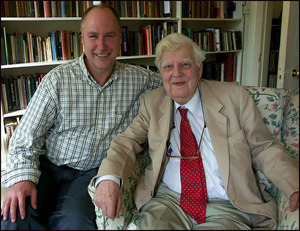

Dr. Richard Kortum and Sir Michael Dummett
JOHNSON CITY - East Tennessee State University's Dr. Richard Kortum, an associate professor in the Department of Philosophy and Humanities, has written "Varieties of Tone: Frege, Dummett and the Shades of Meaning," recently released by Palgrave MacMillan of London.
The book, a lengthy challenge to current theories of linguistic meaning, is written primarily for philosophers, theoretical linguists and those interested in communication theory.
"But," says Kortum, "I have done my best to make the content accessible to a wider audience-to anyone with an interest in the workings of language, and in particular, the subtleties of ordinary words and expressions."
"Varieties of Tone" is not a textbook; it is an original philosophical investigation into the nuances of language with important repercussions for these fields. The 274-page volume is the first comprehensive study of the workings of "tone," an ingredient of meaning exemplified by the hard-to-pin-down differences between words and expressions that are very close in meaning.
Kortum says, "Consider, for instance, the pair of sentences, "Michael Jordan perspires heavily' and "Michael Jordan sweats heavily.' Are the words "perspire' and "sweat' interchangeable, or do they bear slightly different meanings? One seems to be more "polite' than the other, but interchanging them doesn't affect the truth or falsity of sentences in which they occur.
So, philosophical accounts that try to explain the concept of meaning in terms of truth, or the conditions that make a sentence true, have a problem with these kinds of words."
As a graduate student at Oxford University, Kortum studied the works of Gottlob Frege, a late 19th and early 20th century German mathematician and philosopher celebrated as the founder of modern logic.
At Oxford, Kortum studied under the supervision of Sir Michael Dummett, then holder of the Wykeham Chair of Logic, who was subsequently knighted by Queen Elizabeth II in 1999. Dummett is widely regarded as one of the greatest analytic philosophers of all time, and the leading voice in the field of semantics, or theory of meaning. Kortum and Dummett remained friends until Dummett's death at the end of last year. The book is dedicated to him.
Kortum explains, "While working on my dissertation on Sir Michael Dummett's form of a theory of meaning, I discovered that there were, indeed, a great many examples that did not fit the framework established by Frege and Dummett. In the past few years I have been able to greatly expand on my earlier work and develop my own thoughts into a book-length argument."
Other examples Kortum cites-and examines in his book-are word pairs like "and" and "but," "before" and "ere," "truly" and "verily," and "cheekbone" and "zygoma." Frege identified two dozen examples of such "tonal" expressions, and Dummett added several of his own to the list. In his book, Kortum presents a handful more. In "Varieties of Tone," he carefully analyzes each kind in turn.
The workings of language, or language-like forms, in many manifestations fascinate Kortum. In addition to authoring his new book, he concurrently explores other venues that involve questions of interpretation. He teaches and conducts research on forms of animal communication and the capacity for non-human thought and language use. He asks, "What exactly is meaning? How do certain marks or utterances "get meaning,' or become meaningful?"
That curiosity takes him halfway around the world each summer to a remote glacier lake in the Altai Mountains near Mongolia's border with China. There, at the Biluut Petroglyph complex, which he discovered in 2004, he studies ancient petroglyphs, burial mounds, deer stones and other tangible remnants of the culture and ways of life of ancient nomadic peoples of Central Asia and South Siberia.
For Kortum, research into the meaning of these forms of human expression from preliterate times connects directly to the theory of meaning as this is applied to contemporary language use and users.
"The meaning of "meaning,'" he says. "In philosophy it doesn't get any deeper than that." His research in this area will also add to the understanding of the theory of meaning.
For further information, contact Kortum at (423) 439-6492 or kortumr@etsu.edu.